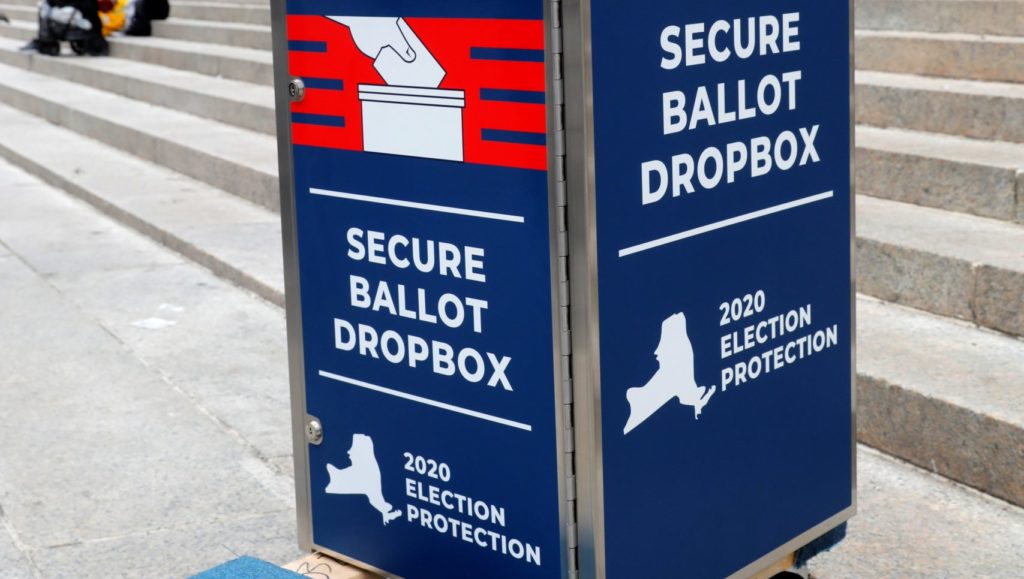This November, New Yorkers vote on Proposition 1 -- a constitutional amendment that its Catholic and pro-life opponents warn could undercut parental rights and increase access to abortion on demand.
Titled the Equal Rights Amendment, the proposition ostensibly mandates fair treatment for all people under the law. But its ambiguous and broad language leads critics to believe passage of the amendment would have far-reaching and unintended consequences.
"It looks good, sounds good," said Ayesha Kreutz, executive director of the Coalition to Protect Kids-NY, an anti-Prop. 1 organization. "But it allows for massive amounts of interpretations."
"The title (Equal Rights Amendment) seems innocuous, it seems frankly noble. Who would be against that?" said Kristen Curran, director of government relations for the New York State Catholic Conference. "That's sort of what we're up against in terms of educating people about what the consequences could be."
The Equal Rights Amendment ballot proposal states: "No person shall, because of … sexual orientation, gender identity, gender expression, pregnancy, pregnancy outcomes, and reproductive healthcare and autonomy, be subjected to any discrimination."
To start, the ERA is unnecessary, said Dennis Poust, the Catholic conference's executive director.
"New York already has robust protection of civil rights in state statute and in the constitution, as well as in many local and county human rights laws," he said. "There is no evidence whatsoever that this broad network of legal protections is inadequate."
Both legal abortion supporters and pro-life advocates believe the amendment would more deeply enshrine access to abortion in the Empire State.
Planned Parenthood of New York states that the ERA would "protect against any government actions that would curtail a person's reproductive autonomy or their access to reproductive health care. For example, the ERA would prevent the state from implementing a state abortion ban, stopping state funding for abortion via Medicaid, banning private insurance coverage of abortion (or) adding medically unnecessary burdens on patients or facilities."
Michele Sterlace-Accorsi, executive director of Feminists Choosing Life of New York, agreed, saying that though there are currently few limitations on abortions in New York, passage of the ERA threatens any chance of putting common-sense standards into place. "It ties the hands of future legislators," she said.
Fewer restrictions could increase the rates of abortions performed on minors and the number of late-term abortions.
"We embrace and promote principles of nonviolence and nondiscrimination, and the ERA discriminates against all unborn children," she said. "This continues to normalize a procedure that violently kills children."
Others are worried the ERA would undermine parental rights, as any hindering of gender expression could be deemed unconstitutional were the amendment to pass.
"Minors should not be getting medical procedures without their parents' knowledge or consent, whether it is puberty blockers, abortions, shots, dental work -- it doesn't matter," said Kreutz. "What this amendment basically could do is give minors the right to irreversible medical procedures without parent notification and consent."
Additionally, Kreutz worries the ERA will undermine girls' sports, destroy women-only spaces and trample on religious liberties. "It's a trap and people have to know not to fall for it," she said.
New York's institutions coming between parents and their children who experience gender dysphoria, the feeling that one's bodily sex and gender identity are not aligned, isn't hyperbole, said Kreutz.
"(It's) already happening right now," she said, emphasizing that passing the ERA would make it more difficult to combat this.
For example, this year Jennifer Vitsaxaki of Skaneateles filed a lawsuit against her child's school district after teachers helped her daughter socially transition to identifying as male without her knowledge. This behavior is allegedly facilitated by the state's Education Department, which advises school leaders that "only the student knows whether it is safe to share their identity with caregivers, and schools should be mindful that some ... students do not want or cannot have their parents/guardians know about their transgender status."
Planned Parenthood performs abortions and provides gender transition hormone therapy, giving them a substantial incentive to advocate for the amendment, argued Curran.
"We've seen, just recently and in New York, young people who now have lifelong problems beginning to sue Planned Parenthood because (it) gave them hormones," she said.
One of those young people allegedly harmed by Planned Parenthood is Cristina Hineman. Her lawsuit states that she sought treatment for her gender dysphoria at the Upper Hudson Planned Parenthood, where, after a single, roughly 30-minute visit, she was prescribed life-altering cross-sex hormones. The suit claims clinicians at that Planned Parenthood facility would continue to prescribe her testosterone without question for well over a year, "and in fact would increase her dosage at Cristina's request -- rather than their own clinical judgment."
Later, her breasts were surgically removed. The suit contends, "Cristina is now 20 years old and recognizes that she had been betrayed by the lack of care."
Sterlace-Accorsi said she believes educating voters about the issue can go a long way in defeating the ERA and protecting the vulnerable women and children who would be most impacted by it.
"We know that New York is a policy and culture leader in the nation and in the world, so we're hoping for an upset victory," she said. "That can happen if every person heads out on Nov. 5 and votes against the ERA."

